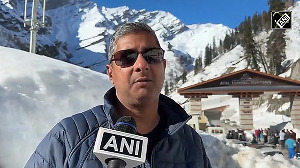PM's main job now is to help create jobs. That's what he has promised, that's what people want and that's what will create a virtuous cycle of consumption and investment, says Debashis Basu.
 Prime Minister Narendra Modi won the 2014 general elections with a highly energetic and imaginative marketing campaign that flamboyantly blended slogans, promises and accusations.
Prime Minister Narendra Modi won the 2014 general elections with a highly energetic and imaginative marketing campaign that flamboyantly blended slogans, promises and accusations.
A year later, we have opinion makers telling us that Mr Modi, the master strategist, has "fallen into the trap" laid by Rahul Gandhi whom he had dismissed disdainfully so far.
And, that Modi has "put his tail between his legs and fled" on the issue of land acquisition Bill.
And, that "he presides today over a pathetic sense of drift, defensiveness and lack of conviction. He seems happier coining slogans than in implementing tough decisions."
Rahul Bajaj, the septuagenarian businessman, known for speaking his mind, said two days ago: "We had an emperor on May 27th 2014 and the shine is wearing off."
Two months ago Arun Shourie said the Modi government lacks clear thinking, has promised a lot but delivered too little and is projecting more than what it has achieved.
There is no big picture in its economic policy, only expediency.
The master of narrative is said to have lost the plot. But what was supposed to be the plot?
It was "change and progress", where the government and businesses both play strong roles. In his 13-year tenure in Gujarat, he had three planks: implementation of many government schemes; no top-level corruption; and attracting businessmen to the state.
As prime minister, he has followed a similar script. He has unleashed a tornado of schemes.
But there is a big difference between a chief minister's schemes and the prime minister's schemes.
What tools does a PM have to implement new nation-wide schemes?
By announcing government schemes with great fanfare, Mr Modi has spent the first year setting distant and unnecessarily tough targets for himself.
He should stop acting as the Prime Chief Minister. Highly publicised and costly nationwide government schemes, which fetch uncertain benefits, will be a negative.
On the second plank, Mr Modi tapped the anti-corruption sentiment that was unleashed and nurtured by Arvind Kejriwal, Baba Ramdev, Anna Hazare and the CAG (Comptroller and Auditor General) reports.
He landed on this prepared ground, easily defined the chief villain, harnessed our anger and sympathy and captured Delhi.
Yes, there has been no top-level corruption so far. What about the third and most important plank, Modi's pro-business approach that creates jobs and prosperity?
He is surprisingly vague and aloof on this score.
While the PM's social schemes are merely wasteful, not focusing on jobs is suicidal.
After his Australia trip last year, he is neither seen with businessmen nor has he addressed them.
Probably, Arvind Kejriwal's pre-election jibes (that he is doing the bidding of Messrs Ambani and Adani) and Rahul Gandhi's post-election ones (suit-boot ki sarkar) have pushed him on to the back foot, and he does not want to give them new ammunition.
In an interview he gave before his trip to France, he was surprisingly rude and caustic about businessmen.
This is a mistake. Mr Modi's main job now is to help create jobs. That's what he has promised, that's what people want and that's what will create a virtuous cycle of consumption and investment.
All of us know that jobs will not be created by the government. They will be created by businessmen, small and big.
What about his diffidence as to what his Opposition leaders say about his pro-business policies?
Well, how hard it is to blunt Rahul Gandhi's and Kejriwal's jibes by citing that he is not supporting any particular businessman but anyone who creates jobs?
More business activity will also result in higher competition and lower prices which benefits all citizens.
This is, of course, not as simple as it sounds. Successive governments (including this government) have made the lives of businessmen tougher.
Mr Modi can create a small temporary team in the PMO whose only job would be to listen to businessmen's mann ki baat referring to global best practices.
Common and recurring problems can be clubbed and eliminated from the roots. This will require working with the states (at least the BJP-ruled ones).
The team could also pick up a few large projects to monitor and understand the bottlenecks they face, right up to the implementation stage, so as to recommend systemic changes.
Would Mr Modi make a decisive move in that direction? Or should we expect more of what we have got so far?
Even if he continues this way, it would not be any worse than the previous governments.
But we would end up far short of what Mr Modi could have achieved.
If he wants to make his government more effective, he needs to do something different from what he has done so far.
He needs to have a fresh and easy-to-understand idea, from which will follow the right narrative. Fortunately, such an idea exists, right in his own pre-election agenda: job creation.
If there is just one major test that the people of this country will put Mr Modi to, it is his election promises of development and prosperity that fetched him the massive mandate.
The first step towards that is working with businessmen to create jobs. Not focusing on jobs will be his biggest undoing, not the Parliament logjam or pending Bills.
In contrast, job creation is a silver arrow that will earn him votes, discredit the Opposition and set him the path of re-election.
Debashis Basu is the editor of www.moneylife.in













 © 2025
© 2025